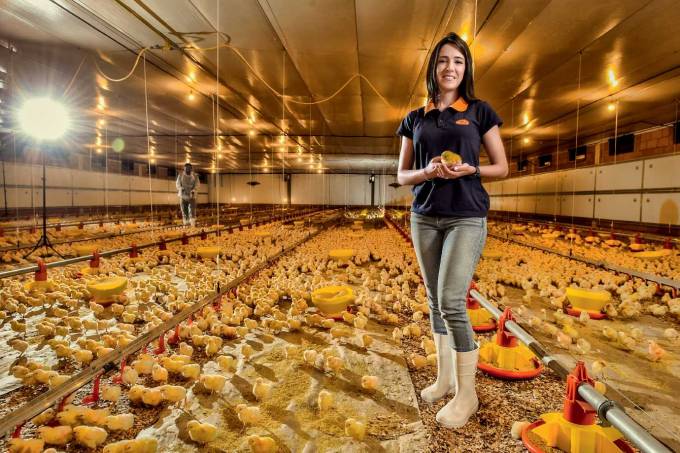RIO DE JANEIRO, BRAZIL – At the age of seven, rural producer Luciana Dalmagro, now 34, lived closely with the birds. She would spend every weekend on her family’s farm in Batatais, a town some 400 kilometers north of the state capital, created four generations ago by her great-grandparents.
At the time, the family planted coffee and sugar. Some chickens would run loose on the property. “I was delighted with the birds,” says Luciana. “I used to think about how the egg was formed and I found it fascinating to follow the chickens’ growth.”

Today, 27 years later, Luciana has plenty to celebrate. She has converted the family farm into a thriving business that makes millions of reais a year and serves gourmet markets in Europe. Luciana expects to produce three million chickens this year, an increase of over 10 percent compared to 2019, making her one of the country’s leading poultry producers.
With agribusiness at its peak in history, with an expected turnover of R$728.6 billion this year, 2.5 percent more than in 2019, and record exports, Luciana’s business has it all to grow. “I am investing more and more in technology and sustainability, which is a growing market demand and also something I personally believe in,” she says. Luciana installed dozens of solar panels on the farm and introduced water reuse methods.
Luciana has also invested in traceability and animal welfare systems. Electronic devices and sensors monitor the air quality on the farm, the temperature, and the water and feed consumption of chickens. Equipment simulates sunrise and dawn to provide a more pleasant environment for the chickens.
Cell phones or making noise are not allowed inside the farm. “All this is important so that the chickens can grow properly and not experience stressful situations,” says Luciana.
But it wasn’t always like that. Much of this strategy came into play when Luciana took over the business five years ago. It was years of preparation for that moment. Luciana was the first in the family to have an MBA – she studied business management at Fundação Armando Alvares Penteado (FAAP), in São Paulo. Before that, she completed a master’s degree in science at the Federal University of São Paulo (UNIFESP). For her undergraduate degree, she chose pharmacy, which she studied at the Campinas Pontifical Catholic University (PUC).
Chickens played a decisive role in all this. “It’s important to understand the performance of drugs, feed and other products given to birds to take good care of them,” says Luciana.
The inspiration for her commitment to study came from inside her home. Her mother, biologist Eliana Portugal, now retired, was a researcher at the Adolf Lutz Institute, one of the country’s major research references in the neighboring city of Ribeirão Preto. “She was very committed and extremely studious.”
In 2010, after completing her academic training, Luciana finally returned to the countryside – and to the farm, where she works from Monday to Friday. “It was good to stay away because I found myself and realized that rural production was what I really liked,” she says. “At the same time, my training was crucial for the work on the farm.”
Poultry farming also offered Luciana surprises and pleasant encounters. In 2014, she met her husband, a veterinarian in a large poultry farming company, during a conference in the United States on chicken farming. “I have a happy marriage,” she says.
Today, she, her husband and her 4-year-old son live in a house with a more than 1,000-square-meter back garden in Batatais, near the farm. They plant everything they eat, from greens to fruits and vegetables. “My son, Antonio, already takes care of the garden and socializes with the animals on the farm,” she says. “Soon he will know as much about chickens as I do.”
Source: Exame

